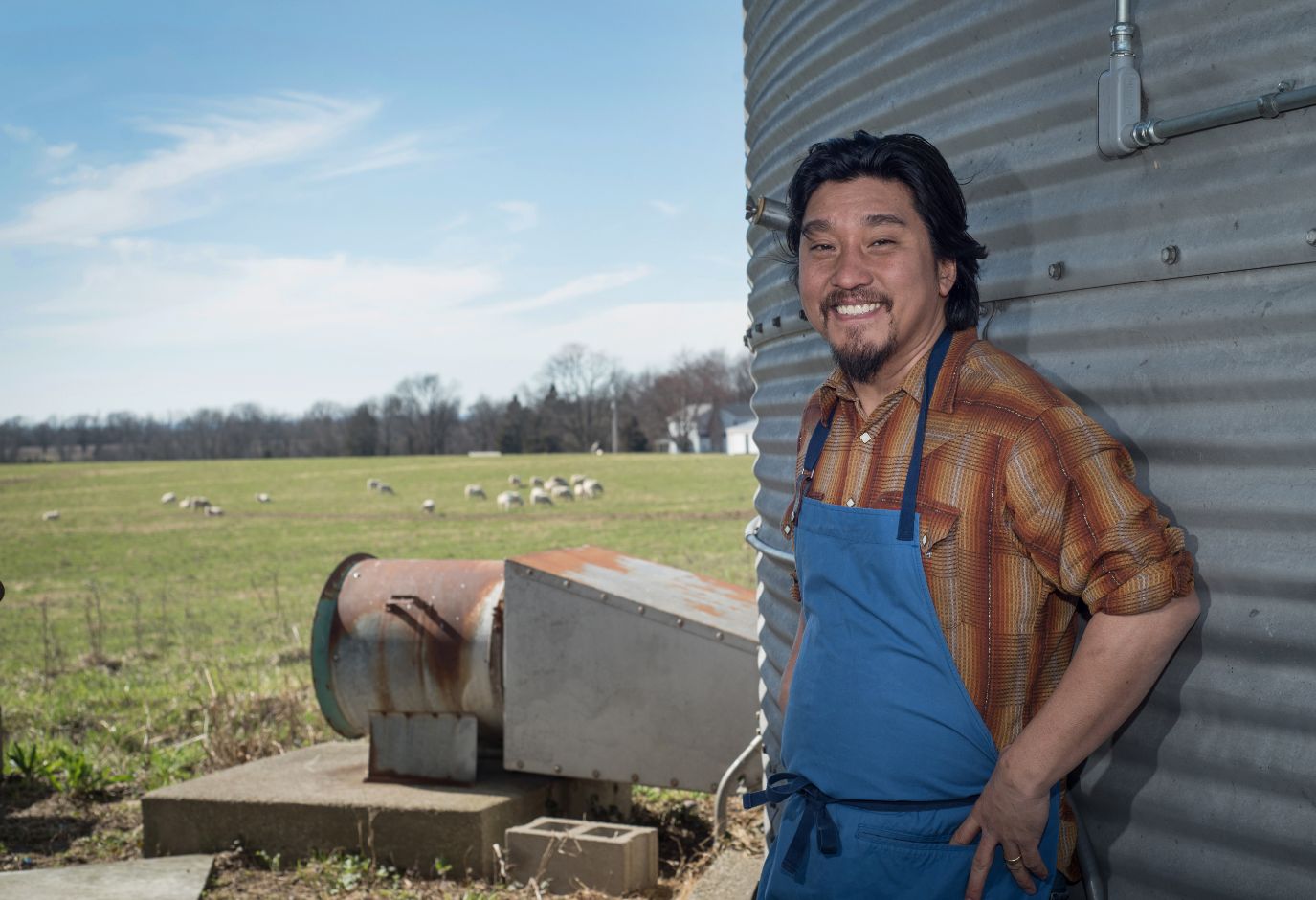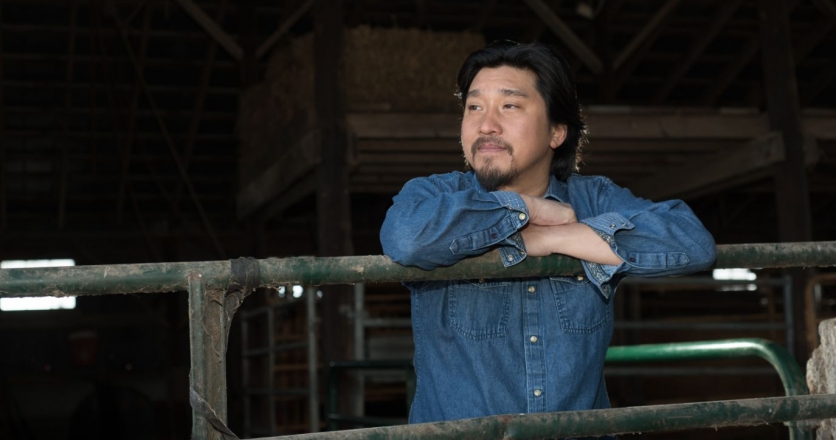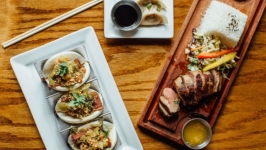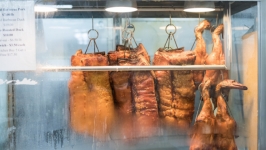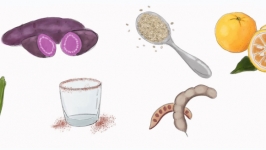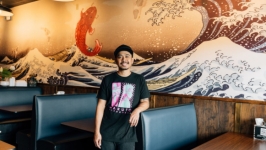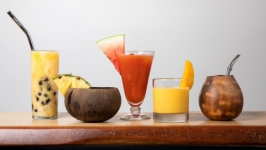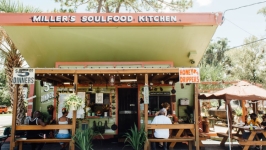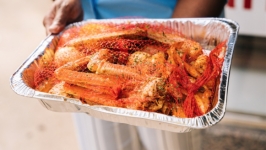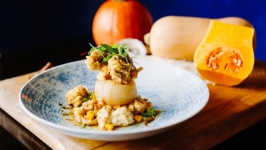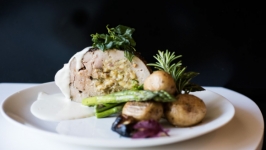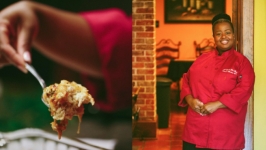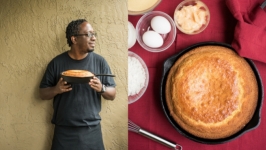A Conversation with Chef Edward Lee
In its 18th year, St. Johns Reads is the St. Johns County Public Library System’s annual “One book, One community” event focused on creating a shared conversation of a selected novel. This year, SJCPLS selected “Buttermilk Graffiti: A Chef’s Journey to Discover America’s New Melting Pot Cuisine” by author and chef Edward Lee. In addition to a variety of book discussions and virtual and in-person programming throughout the month of January 2023, Chef Lee is visiting St. Johns County for a special author talk at 2 p.m. on Saturday, Jan. 14. The talk, open to the public, takes place in the Character Counts Conference Center at First Coast Technical College, Building C, located at 2980 Collins Ave. in St. Augustine.
We caught up with Chef Lee while he was preparing for his visit to St. Augustine to learn more about his experiences writing Buttermilk Graffiti and his curiosity about the people, traditions and innovations behind the food we eat.
ENEFL: You’ve said that “Cookbooks are living traditions; they reflect back to us who we are as individual, as a culture,” says Lee. “Show me your recipes and I can tell you who you are.” What do you mean by recipe?
Lee: As a chef, I don’t really cook off recipes. They’re guidelines, ingredients are interchangeable. Sometimes consumers think cookbooks are bibles, and you have to follow instructions to a T. I’ve never found that to be the case. Even pastry, you can fiddle around with baking recipes. In some ways, in cooking, if you only follow a recipe, you never really learn to cook. You’re just follow a set of instructions. True cooking is following your instincts, your nose, your palate, and cook to taste. In most of my travels, especially when I talk to immigrants who have been growing up with their cuisine, not a single one of them had a recipe. They just cooked by feel and their food was delicious.
How has what you discovered on the road affected your cooking?
It exposed me to a lot more than I knew before, and also proved to me that what I thought I knew about Cambodian, Nigerian or Middle Eastern food, I didn’t really know much. It’s made me a much more curious cook because I realize that to really know a cuisine you have to get out of the kitchen. For example, to understand hummus in a deep way, you have to understand the culture and the people. Not to say that you have to do that for everything you eat, but it’s a beautiful exercise to immerse yourself and makes you respect not just the food but the culture and where the food comes from. Every food keeps evolving.
Food has the power to change opinions – it’s a gateway to culture. When I was younger, I never had a passion about going to Mexico. Then I got into eating Mexican food and I really enjoyed it, and I thought I have to go to see where this food comes from. It propels your curiosity.
You mention evolution of food – is there a point where the evolution becomes appropriation? Is there such a thing as appropriation when it comes to cuisine?
That’s an interesting question. The short answer is no, I don’t believe that because I think food is an art form that is shared and borrowed and moved around. I go to my chef friends’ restaurants all the time and ask how they do things and they are happy to share that information. That exchange of ideas is what propels food forward. The opposite would be that you are only allowed to cook food of your own culture, which is pretty stifling. However, if you look at food as commerce and not art, then yes, appropriation happens. When you are commercializing and trying to own a type of food, that’s when cuisines are appropriated. As an artistic form, I think everything is to be shared. Mexican, French, Vietnamese, Filipino cuisines, they all reflect a cultural exchange over the years. Globalization means we’re going to see more of that happening.
How do you feel about having libraries lead these public discussions regarding the role of food and culture in our communities?In the time before the internet and the many food shows on television, when I couldn’t afford cookbooks or cooking school, a lot of my culinary education was at public libraries. I really value libraries in a way younger people don’t because everything is online. The beauty of a library is that when I’m searching something about French food, and my eye wanders over to a book about Oaxacan food – that makes me curious so I start to flip to that book to get introduced to that culinary tradition. You may not get exposed to topics other than what you’re searching for on the internet. Whereas when you go to a library you get exposed to so much more because it’s right on the next shelf and an entire world is opened up to you. I think llibraries are incredible institutions.
What’s been the reception going into communities to talk about Buttermilk Graffiti?
It’s been surprisingly warm and welcoming! People have really liked the book. When I wrote it (before Covid), there was no political slant to it. It was pure curiosity, something I wanted to do for a while. It was an odd book for me to write at the time – is it a food book, is it a memoir, is it journalism? It’s a little of all that. People have been responding to it warmly. It brings up a lot of these questions about authenticity and cultural appropriation, and we talk about these topics in rather large audiences, but I think food is a space where, so far, people don’t get so riled up. At the end of the day, we’re just talking about food. But we can talk about these bigger issues of culture, appropriation, how to get along and respect each other without it getting too heated. We get into some heavy stuff at these readings, and I enjoy that. There’s a place to have these discussions, talk about difficult things, disagree or agree, but in a way that’s respectful.
The thing that always surprises me is hearing from people in the audience who have read the book and tell me afterwards ‘you have to go to NC, because in my hometown there are these Vietnamese folks who are doing these incredible things’ or somewhere else with a similar suggestion. Which goes to my point that there’s so much going on with food in America right now, and not in big cities – I could have written 20 more chapters.
Don’t just rely on social media for dining suggestions – you are missing some incredible food if you think those lists on social media are the only places to eat. The sense of discovery doesn’t exist anymore for many people – it’s too easy to just go online and click on a few links. There’s still value to go to a new place and talk to a cab driver or hotel clerk and ask where the really good food is. Every place I go, I hear ‘yeah, you gotta go here, it’s not on any list but it’s great.’ I can say without fail that those have always been interesting experiences.
What’s the main takeaway you want to leave with your readers and audiences?
I want them to be curious, to discover things and take risks. When I went to a suburb of Houston to study the Nigerian restaurants, many of my friends in that city didn’t know about the neighborhood I was exploring. Whatever city you live, I guarantee there is a community to explore in your backyard. They’re not always on the map – there’s some incredible food and cultural experiences to be had. You don’t have to pull out a passport or even get on a plane. It forces you to get out to a neighborhood you’re not familiar with. Your instincts get heightened and you’re like a private investigator of food. All your senses get awakened. It’s very thrilling. There’s an adventure to be had. Go write your own version of this book.
The public is invited to join Chef Lee on Saturday, Jan. 14 for his discussion on “Buttermilk Graffiti: A Chef’s Journey to Discover America’s New Melting Pot Cuisine.” He will also host a Q&A, and sign copies of his book. First Coast Technical College, Character Counts Conference Center, 2980 Collins Ave., St. Augustine, Fl.


